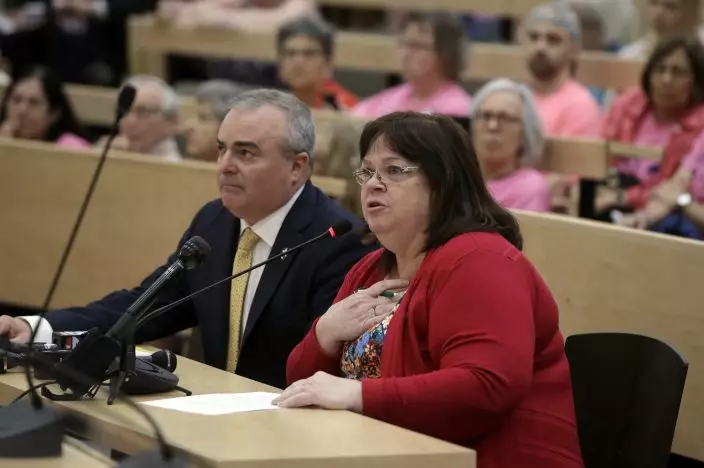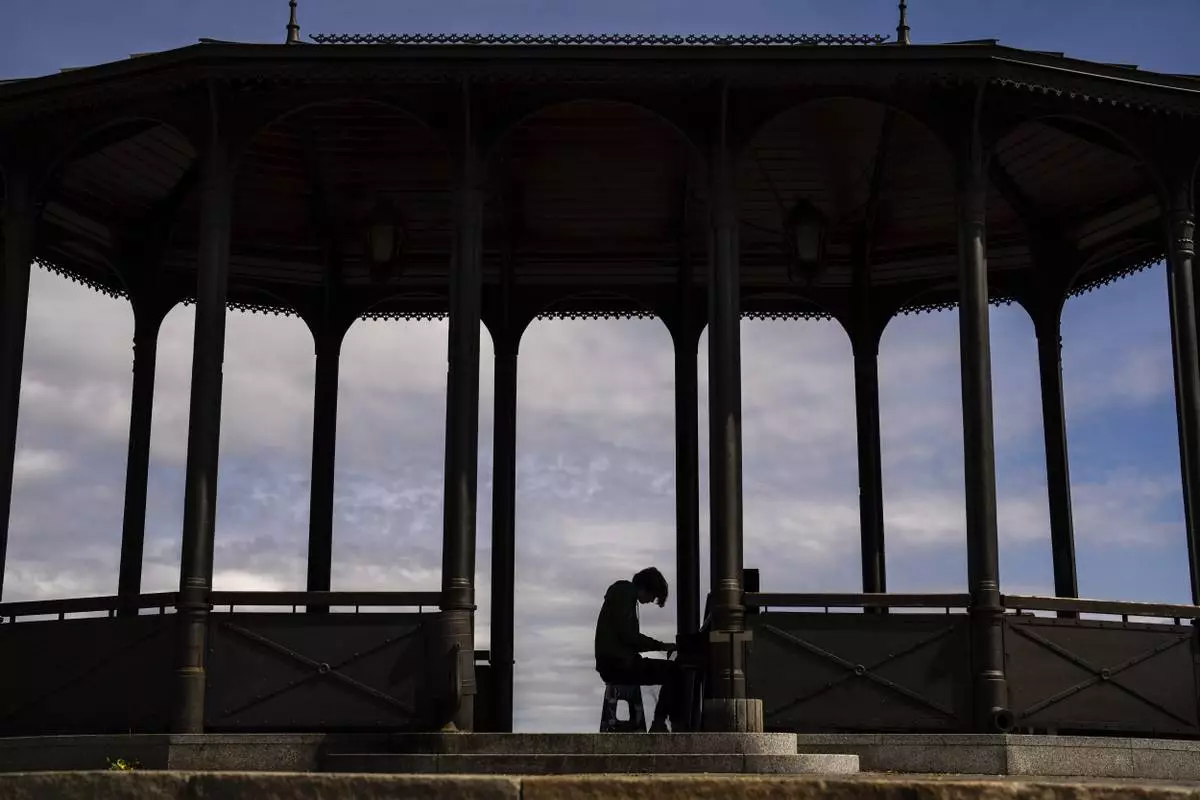Activists on both sides of the abortion divide clashed Monday on a bill in Massachusetts that would let women obtain an abortion after 24 weeks of pregnancy in cases of "fatal fetal anomalies."
The bill, called the "Roe Act" by supporters, would amend current state law, which allows abortions after 24 weeks only to preserve the life or health of the mother.
The bill would also eliminate the requirement that teens obtain permission from a parent or judge before having an abortion.

Mass. state Rep. Colleen Garry, D-Dracut, right, testifies against a proposed bill, called the "Roe Act" by supporters, as Mass. state Rep. David DeCoste, R-Plymouth, left, looks on during a public hearing at the Statehouse, Monday, June 17, 2019, in Boston. Proponents on both sides of the abortion issue testified during the public hearing on a bill that would let women obtain an abortion after 24 weeks of pregnancy in cases of "fatal fetal anomalies." (AP PhotoSteven Senne)
Abortion opponents, many wearing red shirts with the words "choose LIFE, oppose infanticide," crowded the hearing room alongside backers of the bill wearing pink shirts reading, "I Support the ROE Act."
Rebecca Hart Holder, executive director of NARAL Massachusetts, said women seeking abortions after 24 weeks due to fatal fetal anomalies currently have to travel to other states to obtain the abortion. She said some women can't afford the trip and those who can are forced to go through the procedure away from the support of family and friends.
"If a family receives the diagnosis of a lethal fetal anomaly later in pregnancy, they should be supported whether they choose to bring the pregnancy to term or choose abortion," she said.

Mass. state Rep. Patricia Haddad, D-Bristol, seated center, raises her hand while testifying in favor of a proposed bill, called the "Roe Act" by supporters, during a public hearing at the Statehouse, Monday, June 17, 2019, in Boston. Proponents on both sides of the abortion issue testified during the public hearing on a bill that would let women obtain an abortion after 24 weeks of pregnancy in cases of "fatal fetal anomalies." Haddad was flanked by lawmakers also supporting the bill. (AP PhotoSteven Senne)
Critics said the bill is too extreme.
Massachusetts Republican Party Chairman Jim Lyons said in a statement that the proposal will "justify more late-term or partial birth abortions, and even opens the way to born-alive victims suffering painful post-abortion deaths — something that until recently was universally condemned as infanticide."
Opponents also targeted the portion of the bill that would let teenagers obtain an abortion without having to consult with their parents or a judge. Under current law, anyone under the age of 18 must obtain parental consent or have their decision approved by a judge.
The bill would also repeal current state laws requiring what critics call an unenforceable 24-hour waiting period and a requirement that any abortion after 24 weeks take place in a hospital.
Democratic Rep. Colleen M. Garry, a longtime opponent of abortion, said later abortions should be performed in a fully staffed hospital instead of a clinic. She also said the state should more closely oversee clinics.
"Why do we inspect hair salons and nail salons but not abortion clinics?" Garry said.
Critics also said the bill won't require those performing an abortion to do anything to try to resuscitate in the case of an attempted abortion.
"The viable unborn will lose their lives," said Myrna Maloney Flynn, vice president of Massachusetts Citizens for Life.
State Rep. Patricia Haddad said pregnancies that end in a diagnosis of lethal fatal anomaly are wanted pregnancies.
"We are trying to create a compassionate situation on the late end for a very small number of families who receive a diagnosis that is absolutely impossible to wrap your head around," said the Somerset Democrat. "We are trying desperately to speak to a situation that no one wants to find themselves in."
Others who testified in support of the bill included Attorney General Maura Healey and U.S. Rep. Lori Trahan, both Democrats.
The bill still faces a long road ahead.
A final version of the bill must be debated in each chamber and — if approved — sent to Republican Gov. Charlie Baker for his signature.
Baker has previously said he opposes late-term abortions and supports current Massachusetts abortion laws.
On Monday he appeared to crack open the door a bit, saying he's supported recent efforts in Massachusetts to support women's access to reproductive health services and indicating he'd be willing to look at the final bill.
"I do have concerns about eliminating the parental notification requirement that currently exists in state law," Baker said, adding the language in the bill is important "with respects to changing the terms and conditions of late term abortions."










